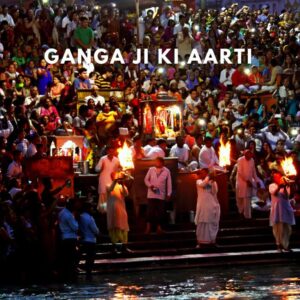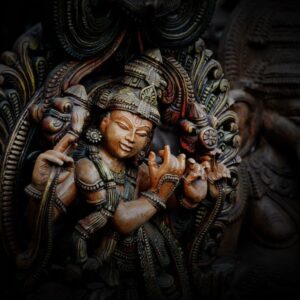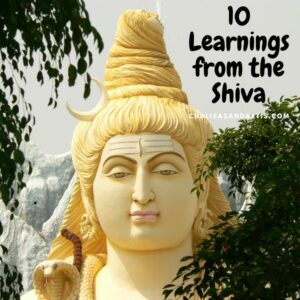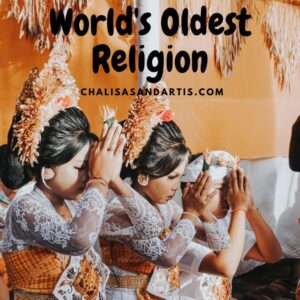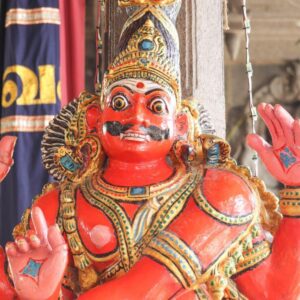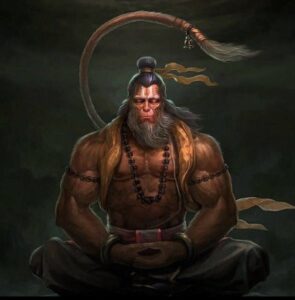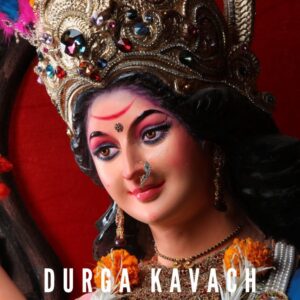Analysis in English and Hindi
Doha in English
Shri Guru Charan Saroja-raj , Nija manu Mukura Sudhaari
Baranau Rahubhara Bimala Yasha Jo Dayaka Phala Chari
Budhee-Heen Thanu Jannikay Sumirow Pavana Kumara
Bala-Budhee Vidya Dehoo Mohee Harahu Kalesha Vikaara
Doha in Hindi
दोहा :
श्रीगुरु चरन सरोज रज, निज मनु मुकुरु सुधारि।
बरनऊं रघुबर बिमल जसु, जो दायकु फल चारि।।
बुद्धिहीन तनु जानिके, सुमिरौं पवन-कुमार।
बल बुद्धि बिद्या देहु मोहिं, हरहु कलेस बिकार।।
Meaning in English
With the dust of Guru’s Lotus feet, I clean the mirror of my mind and then
narrate the sacred glory of Sri Ram Chandra, The Supreme among the Raghu dynasty. The giver of the four attainments of life.
Knowing myself to be ignorant, I urge you, O Hanuman, The son of Pawan! O Lord! kindly grant me strength, wisdom and knowledge, removing all my miseries and blemishes.
Just Few Words Before Starting 40 Verses
In Hanuman Chalisa , The word “Chalisa” comes from the Sanskrit word “Chalis” which means “40”, referring to the number of verses in the Chalisas.
Before knowing what each verse denotes in hanuman chalisa , here is a bried summary of the meaning of each verse:
The first verse introduces Lord Hanuman as the son of Anjana and the devotee prays for Hanuman’s blessings and protection.
The second verse describes Hanuman’s physical and spiritual strength, and his devotion to Lord Rama.
The third verse describes Hanuman’s success in finding Sita in Lanka, and his bravery in facing the demon king, Ravana.
The fourth verse describes Hanuman’s divine nature, and his role as a messenger of Lord Rama.
The fifth verse describes Hanuman’s wisdom and his mastery of the scriptures.
6-13: The next several verses describe various incidents from Hanuman’s life, such as his leap across the ocean, his burning of Lanka, and his meeting with Lord Rama.
14-24: The next several verses describe Hanuman’s various divine qualities, such as his devotion to Lord Rama, his physical strength, and his wisdom. The devotee prays for Hanuman’s blessings and protection, and seeks refuge in him in times of difficulty.
25-40: The remaining verses express the devotee’s love and devotion for Hanuman, and his or her desire for Hanuman’s blessings and protection. The devotee seeks Hanuman’s refuge in difficult times, and prays for Hanuman’s guidance and support in all endeavors.
Overall, the Hanuman Chalisa expresses the love, devotion, and gratitude of the devotee towards Lord Hanuman.
It is considered to be a powerful tool for attaining spiritual growth and happiness, and is recited by devotees of Hanuman as a form of worship and meditation.
Meaning of All Verses
- Jai Hanuman Gyan Gun Sagar: “Victory to Hanuman, the ocean of wisdom and virtues.”
- Jai Kapis Tihun Lok Ujagar: “Victory to the Monkey-God, who illuminates the three worlds.”
- Ramdoot Atulit Bal Dhama: “The divine messenger of Lord Rama, the incomparable source of strength.”
- Anjani Putra Pavansut Nama: “The Son of Anjana, known as Pavan’s offspring.”
- Mahavir Vikram Bajrangi: “The mighty and courageous one, possessing the strength of Vajra (thunderbolt).”
- Kumati Nivar Sumati Ke Sangi: “The remover of ignorance and the companion of the wise.”
- Kanchan Varan Viraj Subesa: “Adorned with golden complexion, he shines beautifully.”
- Kanan Kundal Kunchit Kesa: “With his earlobes adorned with earrings and curly hair.”
- Hath Vajra Aur Dhuvaje Viraje: “In one hand, he holds the Vajra, and in the other, the flag with honor.”
- Kandhe Moonj Janeu Saaje: “On his shoulder, he wears the sacred thread made of Munja grass.”
- Sankar Suvan Kesari Nandan: “The son of Lord Shiva (Sankar) and the beloved son of Kesari.”
- Tej Pratap Maha Jag Vandan: “His divine splendor is praised by the entire world.”
- Vidyavan Guni Ati Chatur: “Endowed with knowledge, virtues, and immense wisdom.”
- Ram Kaj Karibe Ko Aatur: “Always eager to carry out Lord Rama’s tasks.”
- Prabhu Charitra Sunibe Ko Rasiya: “Fondly listening to the divine deeds of Lord Rama.”
- Ram Lakhan Sita Man Basiya: “With Lord Rama, Lakshmana, and Sita residing in his heart.”
- Sukshma Roop Dhari Siyahi Dikhava: “Taking a subtle form, he appeared before Sita.”
- Vikat Roop Dhari Lanka Jarava: “Assuming a colossal form, he set Lanka on fire.”
- Bhima Roop Dhari Asura Sanhare: “Taking a ferocious form, he vanquished the demons.”
- Ramachandra Ke Kaj Samvare: “He diligently performed the tasks assigned by Lord Rama.”
- Laye Sanjivan Lakhan Jiyaye: “Bringing the Sanjivani herb, he revived Lakshmana’s life.”
- Shri Raghuvir Harashi Ur Laye: “Rejoicing with immense delight, he brought joy to Lord Rama’s heart.”
- Raghupati Kinhi Bahut Badai: “Lord Rama praised him greatly.”
- Tum Mam Priye Bharat Sam Bhai: “Considering you as dear as his own brother, Bharata.”
- Sahas Badan Tumharo Jas Gaave: “The thousand-headed serpent, Adishesha, sings your praises.”
- Asa Kahi Shripati Kanth Laagave: “Thus, Lord Rama lovingly embraced Hanuman.”
- Sankadik Brahmadi Muneesa: “Saints, sages, and the divine beings like Lord Brahma.”
- Narad Sarad Sahit Aheesa: “Narada and Saraswati, along with other divine entities.”
- Yam Kuber Digpal Jahan Te: “Yama, Kubera, and the guardians of the directions.”
- Kavi Kovid Kahi Sake Kahan Te: “Even the most learned poets cannot fully describe your glories.”
- Tum Upkar Sugrivahi Keenha: “You rendered a great favor to Sugriva.”
- Ram Milaye Rajpad Dinha: “By reuniting him with Lord Rama, you bestowed him the kingship.”
- Tumharo Mantro Bibhishan Mana: “Bibhishana, the demon king, heeded your advice.”
- Lankeshwar Bhaye Sub Jag Jana: “Becoming the king of Lanka, he became renowned throughout the world.”
- Yug Sahasra Yojan Par Bhanu: “You assumed a gigantic form, extending thousands of miles.”
- Leelyo Taahi Madhur Phal Janu: “Swallowing the sun, thinking it to be a sweet fruit.”
- Prabhu Mudrika Meli Mukh Mahee: “Receiving Lord Rama’s ring in your mouth.”
- Jaladhi Langhi Gaye Achraj Nahee: “You leaped across the ocean without any difficulty.”
- Durgam Kaaj Jagat Ke Jete: “You accomplished formidable tasks in this world.”
- Sugam Anugraha Tumhre Tete: “With your grace, everything becomes effortless.”
- Ram Duware Tum Rakhvare: “You, Hanuman, are the guardian at Lord Rama’s doorstep.”
- Hoat Na Agya Binu Paisare: “Without your consent, no one can enter.”
- Sab Sukh Lahen Tumhari Sarna: “Taking refuge in you, all joys and comforts are attained.”
- Tum Rakshak Kahu Ko Darna: “Under your protection, one need not fear anything.”
- Aapan Tej Samharo Aapai: “You can suppress your own splendor.”
- Teenhon Lok Hank Te Kanpai: “The three worlds tremble at your roar.”
- Bhoot Pishach Nikat Nahi Aavai: “No evil spirit or demon can come near.”
- Mahavir Jab Naam Sunave: “When the mighty Hanuman’s name is invoked.”
- Naase Rog Hare Sab Peera: “All ailments and suffering are eradicated.”
- Japat Nirantar Hanumat Beera: “Constantly chanting Hanuman’s name and glory.”
- Sankat Te Hanuman Chhudave: “Hanuman delivers one from all troubles.”
- Man Kram Vachan Dhyan Jo Laave: “Whoever meditates upon Hanuman with heart, actions, and words.”
- Sab Par Ram Tapasvee Raja: “Lord Rama is the king of all ascetics.”
- Tin Ke Kaj Sakal Tum Saja: “You carry out all the tasks assigned by Him.”
- Aur Manorath Jo Koi Lave: “Those who seek fulfillment of their desires from you.”
- Soi Amit Jivan Phal Pave: “Obtain the eternal fruit of life.”
- Charon Yug Partap Tumhara: “Your glory is renowned in all four ages.”
- Hai Parsiddh Jagat Ujiyara: “Your fame illuminates the whole world.”
- Sadhu Sant Ke Tum Rakhvare: “You protect the saints and sages.”
- Asur Nikandan Ram Dulare: “You are the destroyer of demons, dear to Lord Rama.”
- Ashta Siddhi Nau Nidhi Ke Data: “You possess the eight siddhis and nine treasures.”
- Asa Bar Din Janki Mata: “You fulfill the desires of Devi Janaki (Sita) every day.”
- Ram Rasayan Tumhare Pasa: “You hold the essence of Lord Rama’s name.”
- Sada Raho Raghupati Ke Dasa: “Always remain as the devoted servant of Lord Rama.”
- Tumhare Bhajan Ram Ko Pavai: “By worshiping you, one attains Lord Rama.”
- Janam Janam Ke Dukh Bisravai: “All sorrows of past lives are forgotten.”
- Anth Kaal Raghuvir Pur Jai: “At the end, one goes to Lord Rama’s abode.”
- Jahan Janma Hari Bhakta Kahai: “Wherever a devotee is born, they sing praises of Lord Rama.”
- Aur Devta Chit Na Dharai: “No other deity is revered in their heart.”
- Hanumanth Sei Sarb Sukh Karai: “Hanuman, the bestower of all happiness.”
- Sankat Kate Mite Sab Peera: “All afflictions and sufferings are removed.”
- Japat Nirantar Hanumat Beera: “Chanting Hanuman’s name constantly.”
- Sankat Kate Mite Sab Peera: “All afflictions and sufferings are removed.”
- Japat Nirantar Hanumat Beera: “Chanting Hanuman’s name constantly.”
- Jai Jai Jai Hanuman Gosai: “Victory, victory, victory to Lord Hanuman!”
- Kripa Karahu Gurudev Ki Nai: “Bless us, O Guru, with your grace.”
- Jo Sat Baar Paath Kar Koi: “Whoever recites this hymn one hundred times.”
- Chhutahi Bandi Maha Sukh Hoi: “Is freed from bondage and attains great joy.”
- Jo Yah Padhe Hanuman Chalisa: “Whoever recites this Hanuman Chalisa.”
- Hoy Siddhi Sakhi Gaurisa: “Blessed by Lord Shiva, they attain perfection.”
- Tulsidas Sada Hari Chera: “Tulsidas, the servant of Lord Hari (Rama).”
- Keeje Nath Hridaye Mein Dera: “Requests Hanuman to reside in his heart forever.”
Overall, the Hanuman Chalisa is a way of expressing the love, devotion, and gratitude of the devotee towards Lord Hanuman.
It is considered to be a powerful tool for attaining spiritual growth and happiness, and is recited by devotees of Hanuman as a form of worship and meditation.
With the dust of Guru’s Lotus feet, I clean the mirror of my mind and then
narrate the sacred glory of Sri Ram Chandra, The Supreme among the Raghu dynasty. The giver of the four attainments of life.

